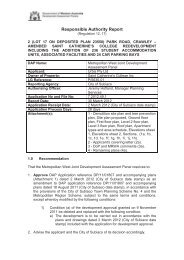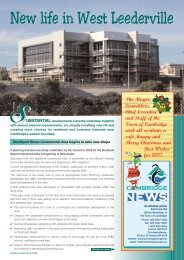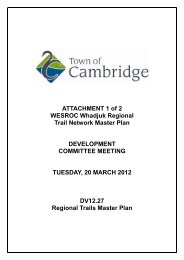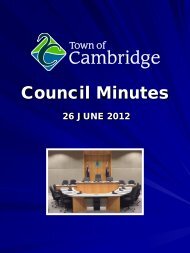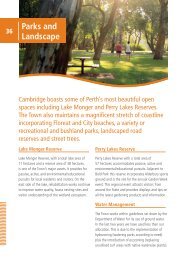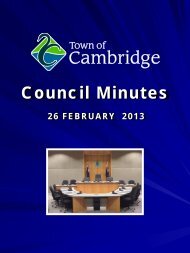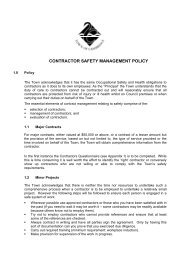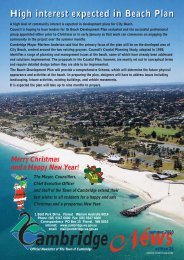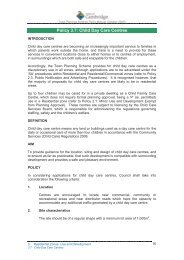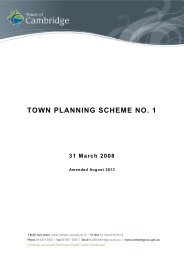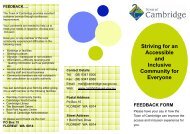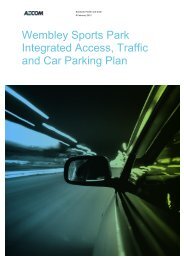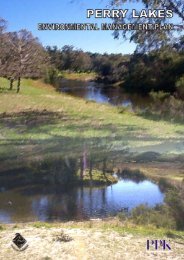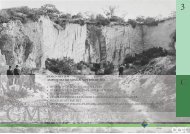Council Minutes - Town of Cambridge
Council Minutes - Town of Cambridge
Council Minutes - Town of Cambridge
Create successful ePaper yourself
Turn your PDF publications into a flip-book with our unique Google optimized e-Paper software.
COUNCIL MINUTES<br />
TUESDAY 20 DECEMBER 2011<br />
Part 1 - Access and Parking Strategy Report<br />
The report, produced from part one <strong>of</strong> the study, provides for long-term strategic direction for<br />
future parking management. The report also incorporates a detailed analysis <strong>of</strong> cash-in-lieu<br />
contribution schemes and the land, construction and operational costs <strong>of</strong> supplying new car<br />
parking facilities.<br />
A summary <strong>of</strong> the Part 1 - Assess and Parking Report is attached. Copies <strong>of</strong> the report are<br />
available on request.<br />
Generally, the report recommends moving away from the traditional 'predict and provide'<br />
approach to parking supply towards a 'demand management approach' to parking. Parking<br />
demand management involves a suite <strong>of</strong> management tools, and may include:-<br />
<br />
<br />
<br />
<br />
<br />
<br />
<br />
<br />
<br />
pay parking;<br />
education programs;<br />
cash-in-lieu;<br />
maximum and minimum parking standards;<br />
parking surveys to monitor parking occupancy and assess effectiveness <strong>of</strong> parking<br />
supply/management;<br />
shared parking;<br />
pedestrian improvements;<br />
alternative modes <strong>of</strong> transport; and<br />
monitoring <strong>of</strong> compliance.<br />
Part Two <strong>of</strong> the study will focus on the future access and parking requirements and policies for<br />
the four defined centres and deliver practical Precinct Parking Management Plans accompanied<br />
with detailed guidance on how to implement the strategic direction over a 5-20 year timeframe.<br />
A 14 week timeframe is anticipated for the completion <strong>of</strong> the second part <strong>of</strong> the study.<br />
COMMENT:<br />
The first part <strong>of</strong> the study draws attention to the fact that if the level <strong>of</strong> development potential<br />
envisaged for the four commercial centres along <strong>Cambridge</strong> Street is to be achieved, there will<br />
need to be a change in the way parking is supplied and managed. Alternatively, the future<br />
development potential for the four commercial centres would need to be much less than is<br />
currently being sought by developers. The challenge is finding the balance between adequate<br />
supply <strong>of</strong> parking to ensure vitality <strong>of</strong> the commercial centres and managing the demand for<br />
parking. Continuing a demand satisfaction approach (based on a 'predict and provide' model) is<br />
unsustainable.<br />
The study recognises that attitudes to parking are not going to change quickly and that changes<br />
to parking management should be gradual and accompanied with an educational program to<br />
draw awareness to the true commercial and environmental costs associated with parking.<br />
The study recommends the <strong>Town</strong> adopt a demand management approach towards parking.<br />
Pay parking is one <strong>of</strong> the most effective ways <strong>of</strong> influencing parking and travel demand and<br />
increases equity as the 'user pays'. The <strong>Town</strong> has already successfully implemented paid<br />
parking around St John <strong>of</strong> God Hospital and the Southport Street Commercial Area to address<br />
parking demand issues for these centres. Undertaking annual parking surveys will inform high<br />
demand areas where the introduction <strong>of</strong> paid parking may be required.<br />
H:\CEO\GOV\COUNCIL MINUTES\11 MINUTES\DECEMBER 2011\B DV.DOCX 106



